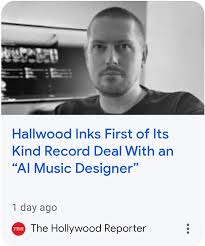In an era where artificial intelligence is reshaping every creative field, the music industry just witnessed a major shift. Hallwood, a respected independent label, has officially signed Imoliver, who is now recognized as Suno’s most streamed AI music creator. While the term "AI artist" may bring to mind robotic vocals or synthetic melodies, Imoliver is far from that stereotype. He’s a human artist—but one who fully embraces AI in his music production process.
His breakout hit “Stone” has already surpassed 3 million streams on Suno, positioning him as a leading figure in the emerging AI music space. With a global release of “Stone” scheduled for August 8, followed by a full album launch in October, Imoliver’s trajectory is drawing intense attention—from fans and skeptics alike.
So what does this mean for the future of music? And why does this partnership matter?

Hallwood’s decision to bring Imoliver on board is not a typical A&R move. It’s a strategic bet on a new hybrid artist model—where human creativity and generative AI coexist, rather than compete.
As Mikey Shulman, CEO of Suno, stated,
“This is a milestone—not just for Oliver, Hallwood, and Suno, but for the future of music.”
And he’s not wrong. Until now, most labels have kept AI music at arm’s length, citing legal uncertainties and questions about authenticity. But Hallwood is taking the opposite route: embracing this transformation head-on, giving an AI-powered human artist a traditional platform with broader distribution and industry resources.
This marks one of the first known record deals involving a human artist who exclusively uses AI tools like Suno to create.
Imoliver isn’t your average bedroom producer. While he writes and composes his own material, every element—from beats to harmonies to final mastering—is done using AI. That doesn’t mean his work lacks soul. Quite the opposite.
“Stone” feels emotionally rich, layered with atmospheric textures and haunting lyrics.
His process often involves prompting AI models for melody ideas, layering those outputs, and fine-tuning them until the song reflects his vision.
Think of it as "directing the AI orchestra."
And it’s working: his tracks consistently rank high on Suno’s internal charts and fan playlists.
Until now, AI music has largely lived on the fringe—used for TikTok background tracks or experimental sound design. But Imoliver’s signing changes that.
Here’s what’s different now:
AI Music Is Becoming Commercially Viable
With millions of streams, there's real demand. Labels are noticing that listeners don’t care if a song was made with AI—as long as it connects emotionally.
Independent Labels Are Leading the Charge
Unlike major labels bogged down by red tape, indie players like Hallwood are more agile and willing to experiment.
Artists Want More Creative Control
AI tools give solo artists the ability to produce studio-quality music without the cost of engineers, session musicians, or expensive plugins.
Of course, this all comes at a controversial time. Suno is currently facing multiple lawsuits from major music companies and GEMA, Germany’s leading performance rights organization. The accusations? Alleged copyright infringement, particularly that Suno’s training data includes copyrighted works without proper licensing.
For now, Imoliver’s music remains untouched by these legal disputes. But as regulators and courts weigh in, the very foundation of AI music platforms like Suno could be at risk.
Still, Hallwood’s move suggests a level of confidence that the technology—and the legal frameworks around it—will mature.

Suno isn’t just another AI generator. It's one of the most popular AI music platforms in 2025, attracting indie creators, influencers, and now, label-signed artists like Imoliver. Key features include:
Text-to-music generation: Users describe a vibe or lyric idea, and Suno builds the instrumental.
Style customization: From synth-pop to orchestral cinematic scores.
Collaboration tools: Real-time editing with co-writers or producers.
Pro-tier licensing: Allowing for commercial releases on Spotify, Apple Music, and more.
With platforms like Suno lowering the barrier to entry, we’re likely to see a wave of AI-powered artists who can go toe-to-toe with traditionally produced acts.
Initial fan response to Imoliver’s success has been surprisingly warm. A glance at Reddit threads or TikTok reactions shows a younger generation of music lovers is less concerned with how a song is made—and more focused on how it makes them feel.
And that’s the key. If AI helps artists tell better stories, faster and cheaper, the medium becomes secondary.
Hallwood’s signing of Imoliver isn’t just about one artist. It’s about recognizing a new generation of creators who blend human emotion with machine precision. It's about acknowledging that AI isn’t here to replace musicians—it’s here to amplify them.
As the music industry redefines its boundaries, Imoliver might just be the blueprint for what’s next:
? Artist-led,
? AI-enabled,
? Emotionally resonant.
Keep your eyes (and ears) on August 8. That’s when “Stone” drops globally—and it might just mark the start of a whole new genre.
Q1: Who is Imoliver?
Imoliver is a human artist who creates all his music using AI tools, most notably Suno. His song “Stone” has surpassed 3 million streams, making him Suno’s top AI-powered artist.
Q2: What is Suno?
Suno is an AI music generation platform that allows users to create high-quality songs using text prompts, style presets, and collaborative tools.
Q3: Why is Hallwood's signing of Imoliver significant?
It marks one of the first mainstream label deals for an AI-powered human artist, suggesting broader industry acceptance of AI-assisted music.
Q4: Is AI music legal?
The legality is still being tested. Suno is currently facing lawsuits for alleged copyright infringement. However, tools like Suno Pro offer licensing models for creators.
Q5: Will AI replace musicians?
Unlikely. Most see AI as a creative partner rather than a replacement. It enhances productivity, especially for solo artists.
Learn more about AI MUSIC